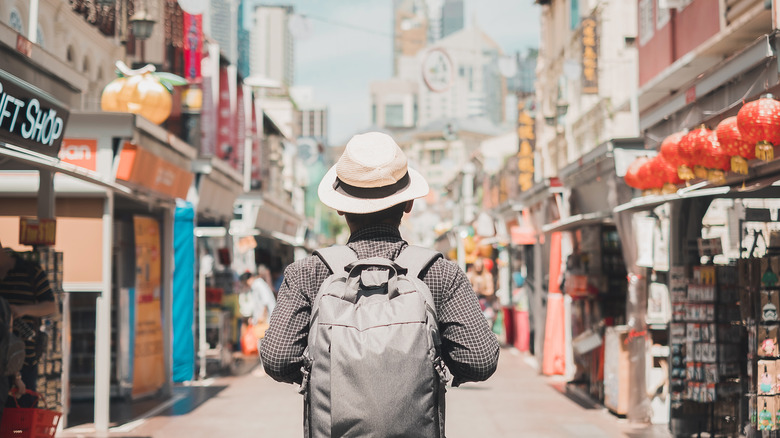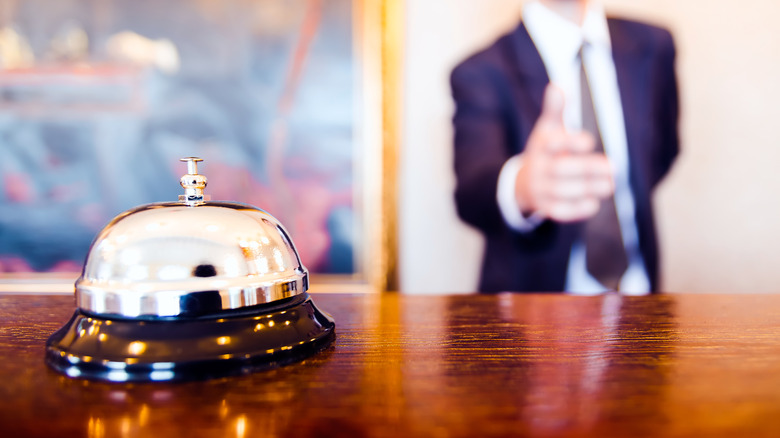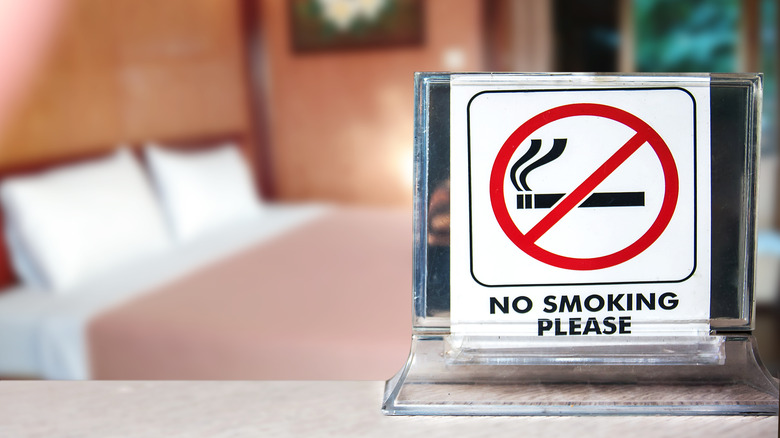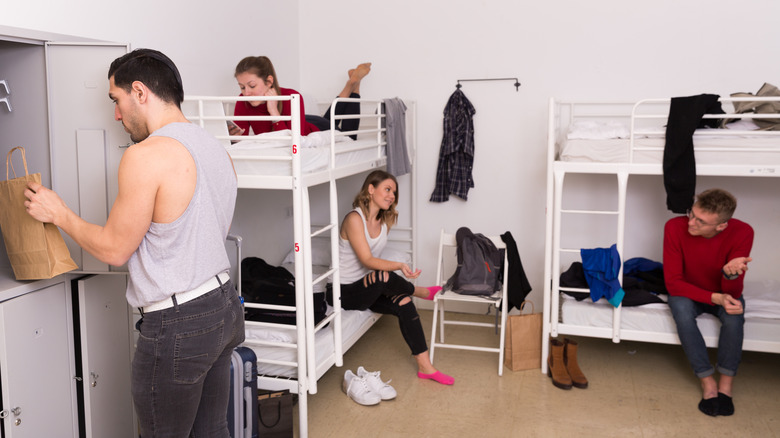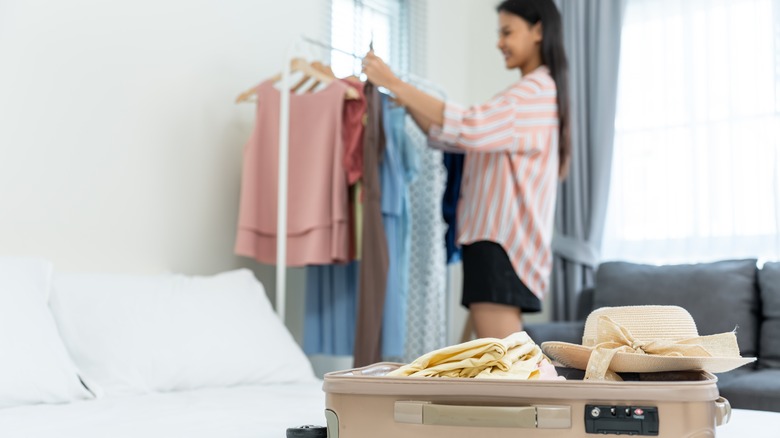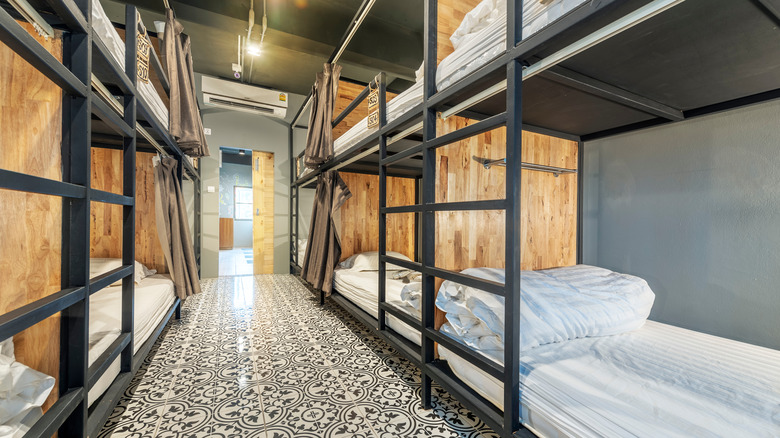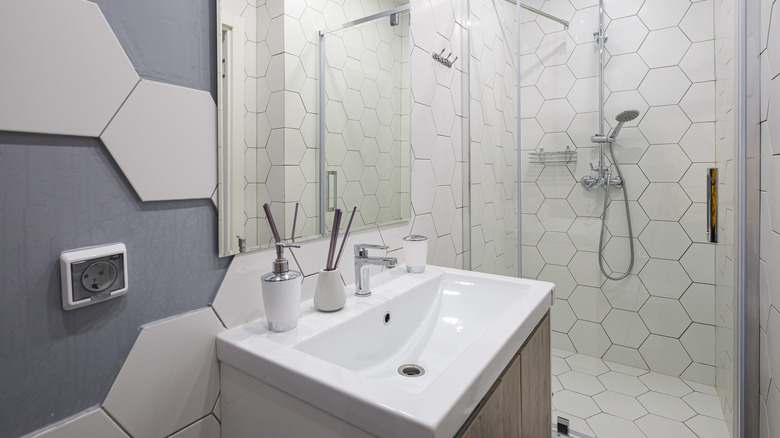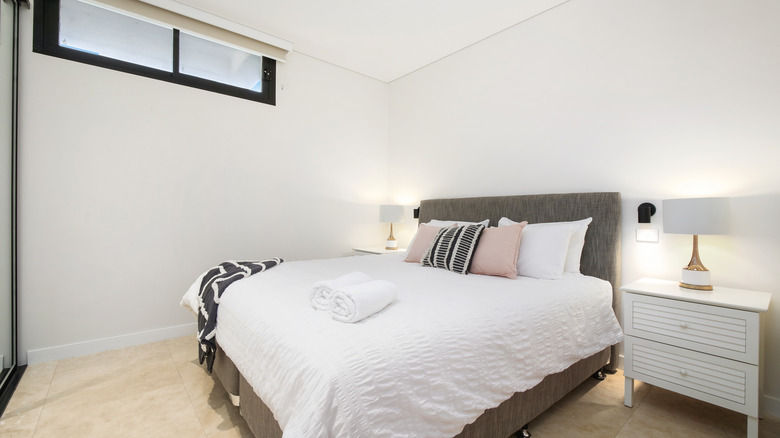The Complete Guide To Hostel Etiquette
Traveling the world doesn't have to break the bank, which is why budget-conscious globetrotters have been taking advantage of the savings that hostels offer for nearly a century. The affordability of hostels does come with what some would perceive as drawbacks, like sharing a room and bathroom with multiple strangers. This community lodging option doesn't have to be seen in a negative light, though, as these same drawbacks can be seen as benefits.
Staying in a hostel can make a trip much more enjoyable and adds a thick social layer to traveling. Of course, staying with strangers and having your trip's lodgings be a communal affair comes with a whole set of guidelines that differ from more common accommodations like a hotel or short-term rental. If you follow these spoken and unspoken rules of a peaceful hostel stay, you not only won't get kicked out of your hostel, but you could walk away with a valuable traveling experience at a fraction of the cost and a whole host of new friends who share your passion for visiting new places.
Choose your hostel strategically
Hostels are not one-fits-all and booking a stay in one that does not fit your needs will not only make your trip more stressful but could also put added stress on hostel staff and other guests. Hostels have been around for a long time and you may have a certain run-down image in your head when thinking of them, but hostels actually come in a number of forms that fit different travel styles, from more modernized lodgings to late-night reprieves for the party-going traveler.
If you have a lot of electronics you need charged during your stay, choosing a digital nomad-friendly hostel will ensure you and your fellow dormers aren't struggling to rotate the outlets. There's nothing good about being the guy who has a laptop, phone, camera, and tablet charging in a dated hostel with seven other guests trying to get charge their phones, too. For travelers who fully intend to keep a late schedule and are prioritizing clubs and dives on their trip, a party hostel is probably a good way to go.
Of course, a lot of travelers don't fall into any particular category and wouldn't be looking for a specialized hostel. In that case, there are a number of amenities to look for in a potential hostel to fit your specific needs. Picking a hostel with a bar, for example, is a great option for travelers who want to socialize with other guests without consistent late nights on the town.
Mind your Ps and Qs
Just because you are not paying luxury prices does not mean you shouldn't act like a decent human being while staying in a hostel. No matter who you are or what your background is, you are completely equal in the eyes of a hostel. Hostels are multicultural spaces and you will most likely be surrounded by all kinds of people of different cultures, classes, ages, and genders, so it's important to practice tolerance and remain on your best behavior socially. It's important to note that since you are essentially living with other people during your stay, you may witness cultural or personal practices you're not aware of that would normally be kept private.
While you certainly should be showing kindness and acceptance in your everyday life, traveling and staying in a hostel will require you to practice tolerance to individuals with any number of differences. For example, Muslim travelers staying in a hostel will most likely use common areas or dorm rooms to pray.
No one wants to deal with sexism or racism in a hostel. Not only does intolerance create an uncomfortable and hostile environment, but it makes people feel unsafe in the place they are laying their heads. Being civil and unharmful to your fellow humans is the bare minimum, especially when sharing quarters with them.
Introduce yourself
It may be tempting to keep to yourself and offer your roomies their own space, especially if you lean more on the introverted side of the personality scale, but any possible awkwardness of an introduction will usually be overshadowed by the uncomfortable, stretched silence that will probably occur if you go without the customary greetings. On the other hand, be prepared for some guests to want to keep to themselves — not everyone wants to make their hostel stay a social experience.
There are so many different types of travelers, most of which you'll meet in a hostel. It'll take some scoping out and observing to identify the personality types surrounding you in a hostel, but introducing yourself is a great way to start out on the right foot with those you'll be sharing space with. If you are someone who struggles when meeting new people, the good news is that most people will be in the same situation of being around people they are meeting for the first time. Plus, you have plenty of time to prepare for the interactions. Icebreakers and travel stories are a great way to open up conversations and get to know your fellow travelers.
Review the house rules
While hotels tend to have their own policies that are more or less universal, hostels tend to have more individualized rules to live by. All hostels are different, and they have their own rules in place to ensure that everyone is able to live in harmony together while keeping the property clean and maintained. For travelers who are staying at a hostel for the first time, the house rules can act as a general guide of how to act toward their fellow travelers and roomies.
You'll find house rules from hostel to hostel have a lot of similarities, though they may differ in the areas where individual accommodations lie. For example, Hostel Pekarna in Slovenia goes into great detail about what is expected within its walls. A lot of the house rules could be general guidelines for other hostels, but there is also other information and expectations laid out that travelers should know before agreeing to stay the night. Checking out the policies and rules of a hostel before you embark on a trip – unless you're a walk-in booking – will save you some hassle, help you plan out your stay, and will ensure your roomies and the staff don't get frustrated with you unknowingly breaking rules.
Respect the property of others
If it doesn't belong to you, it's best to keep your hands off of it. A lot of travelers who use hostels are toting around the essentials and you don't want other travelers catching you with your hands anywhere near someone else's pack. Obviously, stealing from others is morally wrong, but stealing from people who have the majority of their traveling property on hand (including identifications and other necessities while in a strange area) is an even bigger transgression.
While stealing in hostels really isn't as big of an issue as you may have heard it is, respecting people's things goes far in a hostel, as it may be all they have on the trip, or even to their name. Come prepared for your stay so you have little to no need for asking others to part with their resources, and if someone does end up lending or gifting you an item, be incredibly grateful for their forethought and kindness.
Keeping your own things safe is important as well, even though those staying alongside you should have the same respect for your property. Bring locks with you for your belongings and make use of lockers if they are provided by the hostel.
Clean up after yourself
Another misconception about hostels is that they are dirty. In fact, keeping the shared space in a hostel clean is vital for a smooth and considerate stay, especially since there is not very much personal space. The majority of the area will be communal space, from the bathroom and dorm room to the community rooms. It's the same idea as camping or traveling in the natural world, you should leave a space the same as you found it and not leave a trace that you were there. Guests picking up after themselves and keeping the spaces clean also helps to keep costs down, even though the staff tidies things up as well.
By all means, take advantage of any of the community spaces available in your chosen hostel — but be sure to leave it the way you found it. If you use the kitchen to cook and eat, clean up any food or trash that may be a product of said meal. Unpack strategically and take advantage of any builds in storage in your own space in the dorm, but absolutely do not keep your things unpacked and strewn all over the room. There are a number of ways and tips for keeping a clean hostel space, and while there is no guarantee that your roomies will keep things tidy, you'll likely be more popular if your things stay in your own space.
Keep it PG
Okay, more like PG-13. No one really expects hostels to be a sexless environment, but if you're traveling with a partner or happen to hit it off with another guest, other guests will be grateful if you have some discretion. There are acceptable ways to do the deed in a hostel, like taking it to the shower, but there are countless ways not to. The key here is to keep it to yourself and be discrete without making any other guests or hostel staff uncomfortable.
Also, don't sleep naked. If you're sleeping in your birthday suit at home, invest in a pair of PJs while bunking with strangers. Having at least a touch of modesty when it comes to changing can go a long way in keeping your roommates comfortable around you. Usually, bunks will have curtains on the beds for privacy, but, according to Reddit users, quickly changing in the dorm is normal and completely acceptable — just don't walk around or lounge naked for an extended period of time.
Be considerate of sleep hours
One of the biggest benefits of a hostel is having a shelter for sleep, and it's not something you want to mess up for the people who will be bunking with you. Arguably the fastest way to get your roommates upset with you is to encroach on their sleep time. You definitely don't want to be the person who wakes up a room of tired travelers before a day of exploration.
Most hostels will have a set schedule of when guests need to be respectful of sleeping travelers, which means you'll want to make the least amount of noise possible during this time if you yourself are not yet asleep. It is especially important to follow a hostel's guidelines for when quiet hours are because plenty of travelers book lodgings around the hopes of having that time to recharge.
Along with respecting the quiet hours, restful sleep in a hostel is largely dependent on guests keeping the lights out during sleep time. Unless someone is dying or another emergency surfaces in the wee hours of the morning, it's an unwritten rule that guests don't touch the light switch during quiet hours!
Plan around late nights, early mornings
So nice it's on the list twice, it's of utter importance you do everything you can to make your own travel schedule not a hindrance to the sleep of your fellow bunkers. If you plan to go out partying late into the night that's totally fine, but make sure you're able to sober up a bit when stepping back into the dorm room and make it to your bed quietly. If you can't safely get to your top bunk – which comes with a whole host of struggles – see if you can grab some help from someone aware or a worker. Don't let a fun night out turn into a nightmare for your fellow travelers.
Conversely, if you have an early exit planned, have your stuff packed and ready to go in advance. No one wants to be woken up a couple of hours earlier than they had planned by zippers and shuffling. While some travelers like to use plastic bags that are readily available to wrap up and separate items in their bags, Nomadic Matt warns hostel guests against them, saying there is no way to muffle that crinkly sound and that they tend to be pretty noisy in the middle of a silent sleep-filled night.
Hostel bathrooms have their own rules
You may be sharing a room with a number of other travelers if you choose to stay in a hostel, but chances are you're also sharing a bathroom, sometimes with even more guests than are just in your room. While picking up after yourself remains important in the bathroom, there are also a number of other general guidelines that apply only to the bathing area of a hostel.
For one thing, shower shoes are a necessity and totally worth the extra space they take up in your bag. As clean as the shower may look, a lot of feet have seen that slick floor. A quick-drying towel is also a helpful addition to your toiletry pack list when staying in a hostel and will help to cut down on clutter around the room and time spent waiting on a damp towel to dry.
Another rule of thumb for a shared bathroom space is to spend limited time there. Do not hog the bathroom! No one is going to fault you for enjoying a hot shower – in fact, caring about your hygiene is something that positively affects everyone in the dorm – but using up all the hot water and creating a line for the bathroom isn't going to earn you any popularity points.
Respect the space and those in it
While staying in a hostel certainly creates a specialized environment and situations that most people may not be used to, you still are a human being who really should know how to interact with other humans. Treat people the way you would like to be treated, and understand that you are not the only person who has the right to use the space. Remember that you have paid for the bed, but the room and the space should be treated as a shared, community area. While that means you certainly can exist in it, so can your roomies and their interests should be taken into consideration before you act on your own — there's arguably nothing worse in a hostel than a bad roommate.
There are plenty of things a guest can do that would fall under bad etiquette for a hostel, but as long as you keep the need to respect your surroundings at the forefront of everything you do while staying as a guest, you really should not have a problem. It's when guests feel a sense of ownership or ungratefulness to the space that problems may arise. In reality, everyone who is sharing the use of the hostel is beholden to the space as an affordable and relatively comfortable place to rest their heads.
Show the staff some love
At the very least, be pleasant and grateful to the hostel staff for their service. Hostel staff can be a great resource, especially for travelers who have never stayed in a hostel or co-living situation before, and staying on good terms with them may result in the reveal of some useful hostel secrets. They are not only the people who will be checking you in and out of your lodgings but are also frequently the first line of defense if something goes wrong with your stay or if you end up having an issue with another guest.
A lot of the time the people who are working in hostels are actually travelers just like you that have signed up to work along their own journey. While there certainly shouldn't be altered motives in being kind to your fellow human, building a relationship with workers could get you some cool insight on travel locations and tips. While not always the case, being courteous to the workers could also make it easier to switch rooms if the need arises.
Private rooms are an option
Hostels are not limited to community rooms with bunk beds. Plenty of hostels actually have private rooms available to rent, too. There are many reasons why someone may feel they can not reasonably bunk with a number of other people comfortably. Whether you're someone who could wake the dead with your snoring, on a romantic trip with a partner you can't keep your hands off of, or just a messy person in general, you may be better suited to your own private room.
While hostels are typically a very affordable way to travel internationally, it's important to note that some hostels offering private rooms have those rates set much higher and on par with the price of a regular hotel room. For this reason, some travelers use the private rooms sparingly and choose to mix and match their hostel stay by renting a private room either their first or last night there and paying for a bed in a shared space for the rest of their stay. This allows them to settle in slowly or take the time they need to pack up whenever they'd like, without worrying about the possibility of waking any bunk mates.
